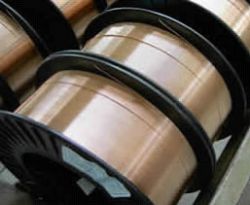- Articles Of Iron Or Steel
- Cloth (including Endless Bands), Grill, Netting And Fencing, Of Iron Or Steel Wire; Expanded Metal Of Iron Or Steel.
- Woven Cloth, Incl. Endless Bands, Of Iron Or Steel Wire (excl. Stainless And Woven Products Of Metal Fibres Of A Kind Used For Cladding, Lining Or Similar Purposes)
Submerged Arc Welding Wire
Product Images
Product Property
| Product Status : | New |
| Sample Available : | yes |
| Shipment Terms : | fob |
| Payment Mode : |
T/T |
Description
 is widely used in many fields, for example, boiler, nuclear power plant, chemical container, bridge, ship and pressure vessel and others. We have different types of submerged arc welding wire listed in each page, our submerged arc welding wire is classified by different welding purpose and our welding wire meets DIN, GB/T, EN and AWS standard. Our H10MnSi is a kind of submerged arc welding copper wire, it can be used with welding flux for automatic submerged arc welding.
is widely used in many fields, for example, boiler, nuclear power plant, chemical container, bridge, ship and pressure vessel and others. We have different types of submerged arc welding wire listed in each page, our submerged arc welding wire is classified by different welding purpose and our welding wire meets DIN, GB/T, EN and AWS standard. Our H10MnSi is a kind of submerged arc welding copper wire, it can be used with welding flux for automatic submerged arc welding. Submerged arc welding wire types: H10MnSi, EM13K Submerged Arc Welding Wire H10Mn2, S4, EH14, S501-H Submerged Arc Welding Wire H13CrMoA, EB2 Submerged Arc Welding Wire H08MnMoA, S2Mo, EA2, YS-M3 Submerged Arc Welding Wire H08CrMoVA Submerged Arc Welding Wire, etc.
Submerged arc welding wire processing:
SAW involves formation of an arc between a continuously-fed bare wire electrode and the workpiece. The process uses a flux to generate protective gases and slag, and to add alloying elements to the weld pool. A shielding gas is not required. Prior to welding, a thin layer of flux powder is placed on the workpiece surface. The arc moves along the joint line and as it does so, excess flux is recycled via a hopper. Remaining fused slag layers can be easily removed after welding. As the arc is completely covered by the flux layer, heat loss is extremely low. This produces a thermal efficiency as high as 60% (compared with 25% for manual metal arc). Processing characteristics:
SAW is usually operated as a fully mechanized or automatic process, but it can be semi-automatic. Welding parameters: current, arc voltage and travel speed all affect bead shape, depth of penetration and chemical composition of the deposited weld metal.

